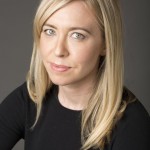Lauren Maffeo works and reports on the global technology sector. As a freelance journalist for The Guardian and The Next Web, she reported on trends including self-driving cars, digital skills gaps in Taiwan and Brazil, the role of apps in aid relief, and a feared digital dark age. Lauren’s writing has also been published and cited by The Atlantic, Skoll World Forum Online, The Diplomatic Courier, and The LSE Review of Books. Today, Lauren works as a content editor at GetApp, where she covers the intersection of software and small businesses. She is also an advisor for Women Startup Challenge Europe, which will be the continent’s largest venture capital competition for women-led startups when it launches at London City Hall in May 2017. Lauren was recently named to The Drum’s 50 Under 30 list of women worth watching in digital. As a proud Europhile and former expat, she has visited 23 countries so far and is likely to be traveling when she’s not working.
How did you end up at GetApp? What was your career path?
My career path started in London. I earned my MSc from The London School of Economics and Political Science. I also have dual citizenship to the United States and the European Union. That allowed me to stay in London following graduation and get networked into London’s small but growing tech startup sector. I spent my first year out of grad school working as a media consultant for London-based startups while covering tech news as a freelance journalist for titles like The Guardian and The Next Web.
I loved the work, people, and city I lived in. But anyone who lives in London will tell you that it’s extremely expensive. That’s why I moved back to the States and took a digital marketing job in Washington, D.C. After that initial role, I moved on to managing content for Aha!, a Silicon Valley-based SaaS company. Today, I’m a content editor at GetApp, which is a Barcelona-based startup that was acquired by Gartner, a global IT research firm. I still live and work in D.C., but my team is based in Spain.
What is a day as Lauren like? Please walk me through a day!
I start every day by walking to my kitchen and making coffee. I am not a morning person and it takes me a long time to feel fully awake. I have an hour-long commute to work and use it to catch up on digital reading, specifically the Quartz Daily Brief. I work in the Arlington, Virginia office of one of GetApp’s sister companies which was also acquired by Gartner. Since my main team is based in Spain, any video meetings I’ll have with them take place in the late morning or early afternoon.
The afternoon is my time to write. As a content editor, I produce everything from case studies and infographics to long-form articles and research reports, all about how technology (specifically, software) impacts small businesses. Depending on which stage a piece of content is at, I’ll either do research, write outlines, polish drafts, or optimize each piece of content for search engine optimization. I also work on more long-term content initiatives and will sometimes have meetings or do research related to these projects.
Since I’m not a morning person, I prefer to arrive and leave “late” relative to typical 9-5 hours. I also prefer to exercise after work and, as a runner, I love the treadmill, which is pretty blasphemous among most runners, I know! So, if I don’t have happy hour plans with friends after work, I’ll hit the gym for a run or HIIT workout.
If I’m hosting an event as co-chair of LSE’s Washington, D.C. alumni chapter or working on outreach for this May’s Women Startup Challenge Europe pitch competition, then I’ll do either of those after work instead. But I try to keep most evenings simple and save energy for the weekends!
What are your responsibilities as a content editor at GetApp?
Let’s say you’ve just opened your own consulting business and are not sure which accounting software you should buy for your business. Through software catalogs, LinkedIn-verified reviews, and product-agnostic editorial content, GetApp’s goal is to help you choose the most relevant accounting software. My responsibility is to propose, research, write, and publish editorial content that will help you make the right choice.
I work with our editorial team to manage all the content that our company produces. This work stretches from doing keyword research for new article ideas to hitting publish in WordPress. Since GetApp is part of Gartner, one of the world’s most esteemed IT research firms, my team also tracks which tech trends Gartner analysts are forecasting. Then, we distill them down for small business owners. Brainstorming ideas based on Gartner research is one of my favorite aspects of this job. Their reports make me excited to work in technology.
People often ask me what content strategy is; how would you answer that question?
It’s a tough one to answer since “content” is an all-encompassing term for anything from a tweet to a research report. When I explain what content strategy is, I generally say that it involves using writing to impact a business. In other words, the content you create should achieve a larger goal, whether that goal is to boost your brand or gain customers. And all of those goals should be measurable.
What is your favorite thing about working in the world of content strategy?
The combination of independent creativity with team collaboration. I love to read, and this role is a strong fit for that passion. I’m expected to research and pitch content ideas throughout each month. So, I subscribe to several newsletters including Brain Pickings by Maria Popova and First Round Review that will help me approach the topics I write about in a new way. I devote substantial time to reading each day and love considering how a big idea (like automation “stealing” human jobs) can be applied in more tangible terms.
What’s your number one content strategy tip?
Have a strategy! That sounds so obvious, but you’d be amazed by how much content is created with no end goal in mind. I encountered this early in my career. I was hired by CEOs of small startups who knew they needed to invest in content, yet had no clue why they needed it, what they wanted it to achieve, or how to advise me. Those three things should align before any content is created.
What are the most important characteristics someone needs to be successful in your role?
Successful content editors are curious communicators. These traits are key no matter how extroverted you are or are not. The digital media world changes so quickly that you can’t afford to get complacent. You have to stay informed on what’s happening both in this industry and beyond. You also need to articulate those changes in writing and through conversations with colleagues, customers, and readers. So, I think a “student” mindset is essential.
What has been the proudest moment from your career so far?
My proudest moment as a freelance journalist came when an article I had written for The Guardian was cited in The Atlantic—my favorite magazine. I remember thinking that even if I never wrote another article again, that achievement would always satisfy me.
I’m also really proud to be involved in organizing Europe’s largest venture capital competition for women-led startups. The event will be held at London City Hall in the office of Mayor Sadiq Khan, who is a strong advocate for women in tech. We’ve recruited judges including Emma Sinclair MBE (the youngest person to IPO on the London Stock Exchange) and Gina Miller (the entrepreneur who launched a landmark UK Supreme Court case on parliamentary sovereignty after the country’s Brexit vote). And we’ve had hundreds of applications from women-led startups to pitch their businesses and earn the investment of 50,000 euros. Women Startup Challenge Europe is hosted by Women Who Tech, which is a D.C.-based nonprofit. So, this project feels very full circle given that I started my career in London’s tech sector—and my LSE dorm was a five-minute walk from London City Hall.
What is your best advice for someone who wants to get into the content strategy field?
Write regularly. There are so many free ways to do this, from platforms like LinkedIn and Medium to creating a WordPress blog and contributing op-eds to established publishers like Forbes.
But don’t just write whatever comes to mind. Be intentional about who your audience is; why you are writing about specific topics; and the unique insight that you bring to your articles. This is where content strategy comes in; it keeps successful writers from getting lost in online noise.
You also are very involved in the community, including serving as Co-Chair of Alumni and Friends of The London School of Economics’ D.C. Chapter, and as the Europe Advisor for Women Who Tech. You are also a frequent public speaker at local tech events and panels. Why is being involved in the community so important to you?
There are two reasons. The first is that I worked from home full-time not long ago and was the only employee based in my city. I love working remotely and have written several articles on the benefits of remote work. But working from home means it would be very easy for me to detach from my own city. Without colleagues, an office, or a family, I needed other ways to put down roots here in D.C. I found that skills-based volunteering achieved this in a fulfilling way. My job circumstances have changed since then, but I still believe that volunteering in my city is a big part of what makes it feel like home.
The second reason is that I enjoy public speaking. I wanted to be a broadcast journalist from the time I was young. I love to read and write but wanted to combine that with the chance to meet people out in the field and tell their stories to audiences at home. Speaking at tech events and on panels is my way of balancing flexible, independent work with my passion for public speaking.
What is one thing that you wish you had known when you were starting out your career?
I wish I had been more prepared to struggle. I went out of my way to always have a part-time job or internship through college in D.C. and graduate school in London. I felt like I did everything I could to start my career on the right foot. It was a really rude awakening to graduate into a slow economy in a different country and find consistent contract work, yet nothing that was long-term.
I spent my first two years in the workforce feeling lost. Instead of being more objective about it, I viewed anything that didn’t work out as a personal failure. Hindsight’s 20/20, and now I see how those experiences form a collective whole. But I also struggle with the unknown, and I let that scare me more than it should have. If I could give my newly graduated self some advice, I would tell her not to take things so personally.
What is on your desk right now?
Trinkets from traveling around the world. Right now, I’m looking at a postcard from Canada; a small plate from Swaziland; an ornament from the Czech Republic; and a Christmas market mug from Germany. I also have a black-and-white photo of Big Ben since I never want to be too far from London.
What are you reading right now?
I’m reading Everybody Writes: Your Go-To Guide to Creating Ridiculously Good Content by Ann Handley, which is already reframing how I approach writing. I’ve always considered it a “fixed skill” that someone either has or doesn’t have. This book has the opposite perspective and explains how anyone—from someone who got a D in college English to a Pulitzer Prize-winner—can improve their writing skills.
What is the best advice you’ve ever received?
I read a quote from Grit: The Power of Passion and Perseverance that stuck with me:
“Three bricklayers are asked, ‘What are you doing?’ The first says, ‘I am laying bricks.’ The second says, ‘I am building a church.’ The third says, ‘I am building the house of God.’ The first bricklayer has a job. The second has a career. The third has a calling.”
I am not the sort of person who can disconnect my essence from my work. We all spend so much of our lives at work that the only option for me is to view it as a calling. This quote puts that in perspective better than anything else I’ve read. So, I’d say the best advice I’ve received is to pursue my calling.
What is your career advice for other young professional women?
Be confident in what you do well, but adaptable about how you do it. I felt a lot of pressure in my early twenties to be all things to all people—especially employers. Experience has made me more self-assured about what I excel at and more honest about what I suck at.
What has it been like working in a predominately male industry?
I’ve had a positive experience so far. I’ve been the only woman on a five-person panel before and have been treated with nothing but respect. I’ve also had several male mentors, and it’s heartening to work on Women Startup Challenge Europe with men who get so excited to be involved.
But feelings don’t trounce facts. And the fact is that tech remains very male-dominated. This first hit home for me when a senior director at a tech company I used to work for announced that she was leaving. This was not insignificant since she was the most senior woman at the company. But she had also become someone who I looked up to, both on a personal level and because her leadership style was one that I admired. This reinforced how important it is for young women to have senior women at their companies who they can view as role models. You can’t be what you can’t see.
What is your advice for female founders who hope to raise venture capital funding?
Make a conscious effort to diversify your network. People hire people, and they tend to hire people who are just like them. This is most often discussed in relation to men hiring other men who have similar backgrounds. But working with Women Startup Challenge Europe has shown me that this pattern repeats itself no matter who’s involved: French venture capitalists recommend other French venture capitalists, Irish entrepreneurs recommend other Irish entrepreneurs. The best thing you can do is acknowledge this bias that we have as humans and counteract it by building a network that’s diverse and authentic.































